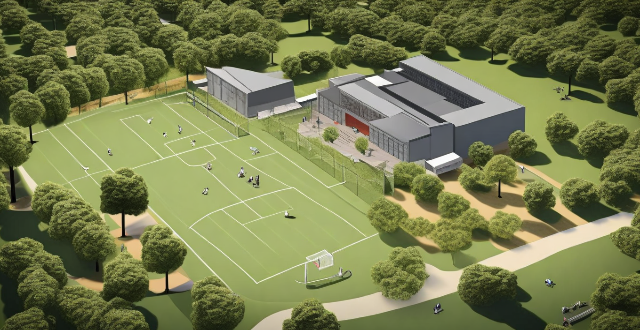This discussion outlines a comprehensive approach to encouraging diversity in sports, including community outreach programs, infrastructure development, policy advocacy, corporate social responsibility, educational institution involvement, grassroots mobilization, and professional sports inclusion. Strategies include awareness campaigns, youth sports programs, accessible facilities, anti-discrimination laws, sponsorship and funding, employee engagement, school sports programs, university scholarships, community champions, cultural events, diversity in management, talent development pathways, data collection, and adaptive strategies. By implementing these strategies across multiple sectors, we can create a robust ecosystem that supports people from diverse backgrounds to participate in sports at all levels, fostering a more inclusive society through the unifying power of sports.

Encouraging Diversity in Sports: A Comprehensive Approach
Introduction
Sports have long been recognized as a universal language that transcends cultural, socioeconomic, and geographical boundaries. However, despite its unifying potential, the world of sports often mirrors societal disparities, with certain groups being underrepresented at all levels—from grassroots to professional leagues. To foster a more inclusive sporting culture, it is imperative to implement strategies that encourage people from diverse backgrounds to engage in sports activities. This discussion will outline several methods to achieve this goal.
Community Outreach Programs
Awareness Campaigns
- Educational Workshops: Organize workshops in diverse communities to educate about the benefits of sports, including physical health, mental well-being, and social skills development.
- Media Partnerships: Collaborate with local media outlets to broadcast stories of athletes from various backgrounds to inspire others.
Youth Sports Programs
- Scholarships and Grants: Offer financial aid for equipment, uniforms, or registration fees to remove economic barriers.
- Adaptive Sports Leagues: Create leagues that cater to individuals with physical disabilities, ensuring inclusivity.
Infrastructure Development
Accessible Facilities
- Public Sports Venues: Build and maintain public sports facilities that are accessible and welcoming to all demographics.
- Transportation Services: Provide transportation for participants who face mobility challenges or live in areas with limited access to sports facilities.
Equipment Donations
- Sponsorship Programs: Partner with sports brands to donate gear to underprivileged communities.
- Second-hand Equipment Drives: Organize drives where used sports equipment can be donated and redistributed.
Policy Advocacy
Anti-Discrimination Laws
- Legislative Support: Lobby for laws that prohibit discrimination based on race, gender, religion, or socioeconomic status in sports programs.
- Monitoring Mechanisms: Establish oversight committees to ensure compliance with anti-discrimination policies.
Gender Equality Initiatives
- Equal Opportunities: Guarantee equal playing time and resources for male and female athletes in school and community sports.
- Women in Leadership: Promote women's roles in coaching and administration to provide positive role models for young female athletes.
Corporate Social Responsibility
Sponsorship and Funding
- Corporate Sponsorships: Encourage companies to sponsor teams or events that promote diversity in sports.
- Charitable Foundations: Establish foundations dedicated to funding sports initiatives for underrepresented groups.
Employee Engagement
- Company Sports Teams: Form company-sponsored teams that reflect the diversity of the workforce.
- Volunteer Opportunities: Encourage employees to volunteer at local sports clubs or events that focus on inclusion.
Educational Institutions' Role
School Sports Programs
- Equal Access to Facilities: Ensure that all students have access to school sports facilities regardless of their background.
- Culturally Sensitive Coaching: Train coaches to be sensitive to the needs of athletes from diverse cultural backgrounds.
University Scholarships
- Athletic Scholarships: Offer athletic scholarships specifically for students from diverse backgrounds.
- Development Programs: Create university-level sports development programs aimed at nurturing talent from diverse populations.
Grassroots Mobilization
Community Champions
- Local Heroes: Identify and celebrate local athletes who have succeeded despite adversity to inspire others.
- Mentorship Programs: Connect aspiring athletes with experienced mentors from similar backgrounds for guidance and support.
Cultural Events
- Multicultural Sports Days: Organize sports events that celebrate various cultures, encouraging participation from all ethnicities.
- Festival Sports Tournaments: Incorporate sports competitions into cultural festivals to attract a wider audience.
Professional Sports Inclusion
Diversity in Management
- Representation in Leadership: Promote diverse representation at the executive levels of professional sports organizations.
- Supplier Diversity Programs: Encourage professional leagues to use suppliers that contribute to the diverse economy.
Talent Development Pathways
- Junior Leagues: Establish junior leagues that feed into professional systems, providing a clear pathway for talented individuals from all backgrounds.
- International Scouting: Expand scouting efforts globally to identify and nurture talent from different parts of the world.
Continuous Assessment and Improvement
Data Collection and Analysis
- Demographic Tracking: Regularly collect and analyze demographic data to measure progress and identify areas for improvement.
- Feedback Mechanisms: Implement feedback systems to gather insights from participants about their experiences and suggestions for enhancement.
Adaptive Strategies
- Responsive Program Adjustments: Be flexible in adjusting programs based on feedback and changing community needs.
- Success Stories Sharing: Share stories of success to illustrate the effectiveness of inclusivity efforts and motivate further action.
By implementing these comprehensive strategies across multiple sectors—community outreach, infrastructure development, policy advocacy, corporate responsibility, educational institutions, grassroots mobilization, and professional sports inclusion—we can create a robust ecosystem that encourages and supports people from diverse backgrounds to participate in sports at all levels. Through continuous assessment and adaptive strategies, we can ensure that these efforts evolve with the needs of the communities they serve, ultimately fostering a more inclusive society through the unifying power of sports.